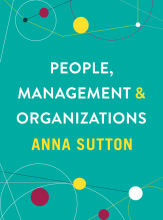The individual and the organization
5 important questions on The individual and the organization
Formal contract employment relationship
Different types of regulation of employment:
- Regulation by law: transparency and security but complex
- Social regulation: bargaining between employers and employees, balance between desires but time-consuming
- Market regulation: supply and demand for skills, greater flexibility but increases social inequalities
Psychological contract employment relationship
Transactional: short term, easy to ext, low organizational commitment, well-defined performance criteria
Relational: loose performance criteria, high commitment, long-term security and loyalty
Managing relationship between individuals and organizations
- Pluralist approach: range of sources of power
- Radical approach: management and workers will always be in conflict, elite group has control (suppression)
- Higher grades + faster learning
- Never study anything twice
- 100% sure, 100% understanding
Types of communication networks
- Conformity: extent to which employees behave in the same way, based on regulative communication network
- Adaptiveness: degree to which organization's adapt, based on innovative communication network
- Morale: ability to enhance employee's positive feelings, based on integrative maintenance communication network
Organizational structure and communication
- Configuration or shape of the organization (better communication in smaller teams)
- Complexity of the organization (more departments=less communication)
- Degree of formalization (more formalization=less communication)
Centralization (decentralization=better communication)
The question on the page originate from the summary of the following study material:
- A unique study and practice tool
- Never study anything twice again
- Get the grades you hope for
- 100% sure, 100% understanding
































